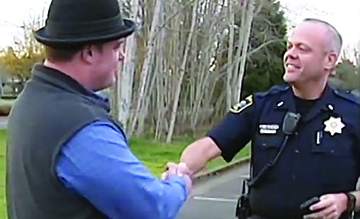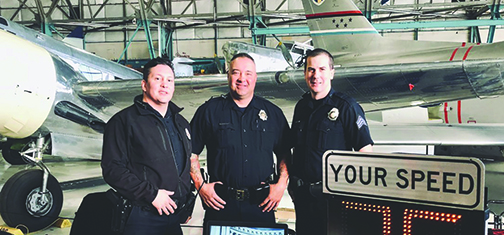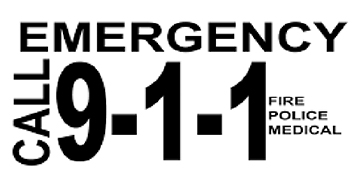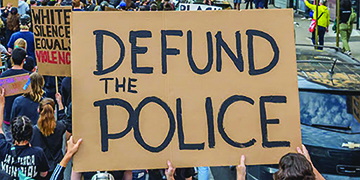
by Luke Schmaltz
In a year when tensions between police departments and the general public are at an all-time high, the notion of appointing individuals to act as liaisons between cops and civilians sounds like a smart, albeit complicated idea. Community Resource Officers (CROs) are assigned to do exactly that and are commissioned to address the non-emergency concerns of citizens ranging from issues such as neighborhood awareness, personal safety and reporting crimes after the fact.

This year has no doubt been especially challenging for CROs, as law enforcement at large is being subjected to hyper-focused scrutiny from mainstream news sources, alternative media outlets and many sectors of the general public. While it is true that the terrible actions of the few have sullied the perception of the character of the many, effective law enforcement holds an ever-crucial role in American society.
Apply A Bit Of Objective Reason
The cry to “defund the police” some citizens argue is an ill-conceived notion that, if legislated upon, would lead to extreme danger. They see a society without law enforcement, especially one as armed, addicted, and mentally afflicted as America, would quickly deteriorate into a dystopian dust bowl of lawlessness. Yet, the current climate is placing unprecedented pressure on police departments nationwide to acknowledge, address, and correct the long-standing stigmas of racism, murder, corruption and inadequate responses to common situations.
Oftentimes, the above stereotypes are perpetuated because police officers are dispatched to circumstances which they are not trained to handle such as ongoing domestic disputes, disagreements between neighbors and mentally challenged individuals who are under extreme duress. Such instances highlight the importance of CROs, and how engaging with them can help residents understand when making a 9-1-1 call is the right move and when a non-emergency situation can be handled through more effective means. Perhaps most importantly, the Denver Police Department (denvergov.org) offers a comprehensive neighborhood watch program,

Find Out What’s Going On
Believe it or not, some citizens may not realize that some “call 9-1-1” situations can be avoided through crime prevention. Denver Community Resource Officers hold regular meetings via their respective district headquarters which are open to the public. Due to Covid-19 precautions, these meetings have been temporarily switched to online Zoom format — hosted by specific neighborhood organizations. Regardless, these meetings are designed to equip residents with ample “Neighborhood Watch” signage for deterring residential crime and to provide crucial information on crime rates and the most recent trends in theft. Further, the DPD website offers comprehensive information on pinpointing and reporting gang activity, graffiti removal, crime statistics and maps, anonymous reporting, volunteer-operated neighborhood “Cop Shops,” victim services and more. Recently, Community Resource Officer for District 3, Kate Young, met with Baker residents in a socially distanced outdoor setting to listen to concerns and offer advice on the best ways to deal with homeless camps, midnight backyard prowlers, and license plate theft.
Get Involved
While it is by no means any citizen’s responsibility to do the job of the police, a little concern and outgoing action can go a long way — and maybe even save a life. A person can report the descriptions of people you see committing crimes such as theft, vandalism and assault. You can also write down the license plate numbers of hit-and-run drivers or burglary getaway cars. Such instances of involvement not only establish communication between your community and local law enforcement, they can also create trust between these two divided sectors of society while enhancing the overall safety of the neighborhood. Meanwhile, it is important to understand that CROs stress that taking care of your own safety first in a crisis — NOT putting yourself in greater danger — is job number one.

Connect On Social Media
DPD is also trying to connect with residents via Nextdoor — a social media platform dedicated to connecting residents of specific neighborhoods within a specific sector of a city. Their page on this platform, however, is more of an informal message board that is not monitored 24/7 and is not a replacement for dialing 911. Citizens with video footage from their doorbell cameras or their smartphones can upload footage of burglars, prowlers and crimes along with incident reports directly onto the DPD Nextdoor page. This is, of course, in addition to making a formal report via the DPD non-emergency number; 720-913-STOP (7867). Posting on this platform and on the DPD thread is particularly useful because other residents can have access to the video feeds, images and descriptions that help them identify danger before the fact or, at the very least, add to the reports of specific incidents and individuals who are out committing crimes. The page also provides tips on preventing theft of motorcycles, scooters, cars, trucks and license plates as well as the protocols for reporting street racing.
Boots On The Ground?
At this point in 2020, Denver Police Department CROs may either be performing a high-wire act or simply tip-toeing on eggshells. This may explain why attempts to contact six different CROs and one volunteer were met with neutral responses. Former CRO Bob Anderson replied to email interview questions by explaining: “I am no longer assigned as a CRO, as I have moved on to a different assignment within the police department. These are all good questions and I have copied the District 1 CRO team on this response so they can respond to your request. Thank you.”

Meanwhile, CRO Kate Young answered a phone call, yet declined an interview or the opportunity to respond to questions about CRO protocol stating: “We have to run our answers by our supervisors before we can say anything to the press. I will try and get back to you before your deadline.”
Lastly, DPD volunteer Christie Mochoruk offered: “Through my personal experiences volunteering with DPD, I’ve witnessed many partnerships formed between our Officers and residents, once those in our community understood how and who to communicate with and the best way to utilize the many resources available to them. I would love to answer some of your questions, but I will need to reach out to the Officers first for permission, as I’m only a volunteer and want to ensure the integrity of the information being shared comes across in the most effective way.”
There was no further reply in the 55+ hours left on this journalist’s assignment hourglass between Monday, October 12 at 7 a.m. and Wednesday, October 14 at 1 p.m.
Perhaps they were all too busy making the rounds in their respective jurisdictions, or maybe the role of CROs is primarily one of forward-facing PR significance and not much else. One thing is for sure; currently there is not enough continual engagement between the public and the CROs to make a noticeable dent in crime and to assuage the general public disdain towards the police. This makes one thing clear — if you’re a citizen who wants things to improve — you’re going to have to meet your CRO halfway.
